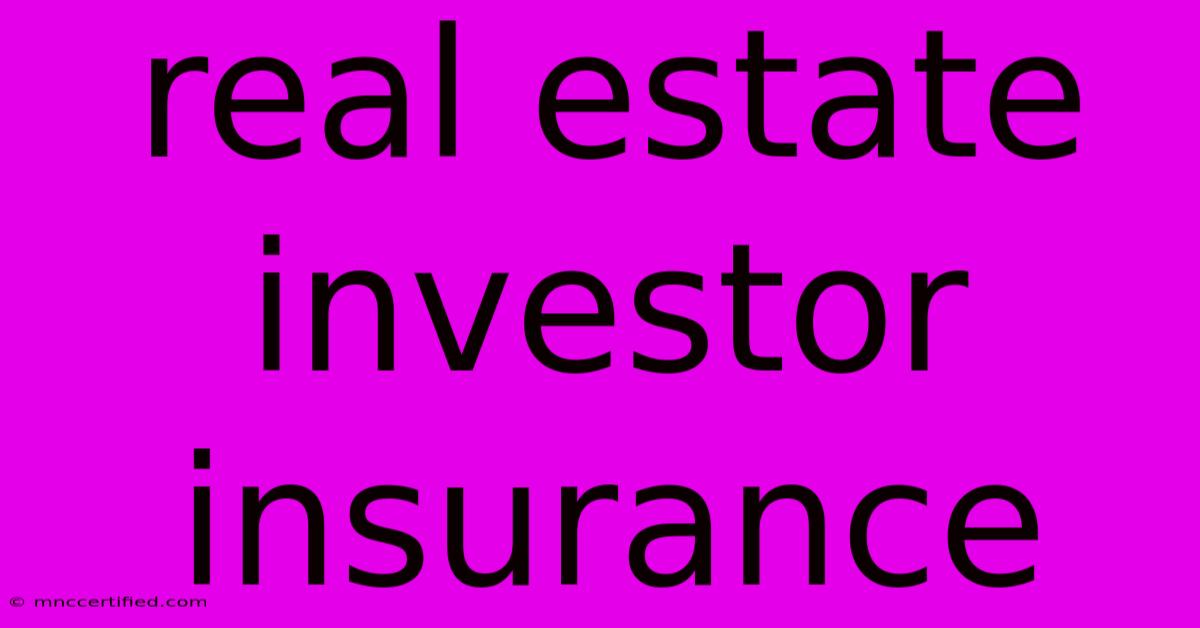Real Estate Investor Insurance

Table of Contents
Real Estate Investor Insurance: Protecting Your Investment
Investing in real estate can be incredibly lucrative, but it also carries significant risks. From property damage to liability lawsuits, unforeseen events can quickly derail your financial goals. That's where real estate investor insurance comes in. This comprehensive guide will explore the different types of insurance crucial for protecting your investment and minimizing potential losses. We'll delve into the specifics, helping you understand what coverage you need and how to find the best policies for your portfolio.
Why Real Estate Investors Need Specialized Insurance
Standard homeowner's or renter's insurance isn't sufficient for real estate investors. These policies typically exclude coverage for business-related activities and the unique risks associated with owning and managing multiple properties. Real estate investor insurance provides broader protection tailored to the specific needs of landlords and property investors. Failing to adequately insure your investment could lead to devastating financial consequences.
Key Risks Faced by Real Estate Investors
Before exploring specific insurance types, let's examine the key risks you face:
- Property Damage: Fires, storms, vandalism, and other unforeseen events can cause significant damage to your properties.
- Liability: Injuries sustained on your property by tenants, guests, or even passersby can result in expensive lawsuits.
- Loss of Rent: If a property becomes uninhabitable due to damage, you'll lose rental income. Insurance can help cover this loss.
- Vacancy: Periods of vacancy increase the risk of damage, theft, and vandalism. Some policies offer specific coverage for vacant properties.
- Tenant Default: Non-paying tenants can create financial hardship. While not directly insured, proper screening and insurance can mitigate risks.
Types of Real Estate Investor Insurance
Several insurance types are essential for a robust risk management strategy:
1. Landlord Insurance: The Foundation
Landlord insurance, often called rental property insurance, is the cornerstone of any real estate investor's insurance portfolio. It typically covers:
- Building damage: Protects against damage to the structure of the property.
- Liability protection: Covers legal costs and settlements resulting from tenant injuries or property damage caused by the tenant.
- Loss of rent: Compensates you for lost rental income due to covered damages.
- Personal liability: Protects your personal assets from lawsuits.
Note: The specifics of landlord insurance coverage vary widely depending on the insurer and policy. Carefully review policy details to ensure adequate protection.
2. Umbrella Liability Insurance: Expanding Your Coverage
An umbrella liability policy provides additional liability protection beyond the limits of your landlord insurance and other policies. It acts as a crucial safety net in cases of significant liability claims. This is especially important for investors with multiple properties or high-value assets.
3. Vacant Property Insurance: Addressing Empty Properties
Vacant properties are significantly more vulnerable to damage and theft. Standard landlord insurance often has limitations or exclusions for vacant buildings. Vacant property insurance provides specialized coverage to address this increased risk.
4. Commercial Property Insurance: For Larger Investments
If you own larger commercial properties or manage commercial real estate, you will need commercial property insurance. This differs from landlord insurance in that it caters to the unique needs and risks associated with commercial operations.
Finding the Right Insurance for Your Portfolio
Choosing the right insurance involves careful consideration of several factors:
- Property value: The value of your properties directly impacts the amount of coverage you need.
- Rental income: The amount of rental income you generate influences your need for loss-of-rent coverage.
- Number of properties: Investors with multiple properties may need more extensive coverage and potentially a commercial umbrella policy.
- Location: Properties in high-risk areas may require higher premiums.
- Tenant screening: While not insurance, thorough tenant screening significantly reduces risk and potentially lowers premiums.
Always compare quotes from multiple insurers before selecting a policy. Don't solely focus on price; carefully review coverage details to ensure you're adequately protected.
Conclusion: Protect Your Investment with the Right Insurance
Real estate investing offers significant potential rewards, but it's crucial to mitigate the inherent risks. Comprehensive insurance is not an expense; it's an investment in the long-term success and security of your real estate portfolio. By understanding the different types of insurance available and choosing policies that address your specific needs, you can protect your financial future and enjoy the benefits of your investment with greater peace of mind. Remember to regularly review your insurance needs as your portfolio grows and evolves.

Thank you for visiting our website wich cover about Real Estate Investor Insurance. We hope the information provided has been useful to you. Feel free to contact us if you have any questions or need further assistance. See you next time and dont miss to bookmark.
Featured Posts
-
Horrified Viewers Call Ofcom Controversial Star
Nov 27, 2024
-
Ucl Clash Grealish Ake Nunes Return
Nov 27, 2024
-
Barcelona Vs Brest Game Preview And Odds
Nov 27, 2024
-
Man City Vs Feyenoord 3 3 Game Review
Nov 27, 2024
-
Conservative Backlash Affects Walmart Dei
Nov 27, 2024